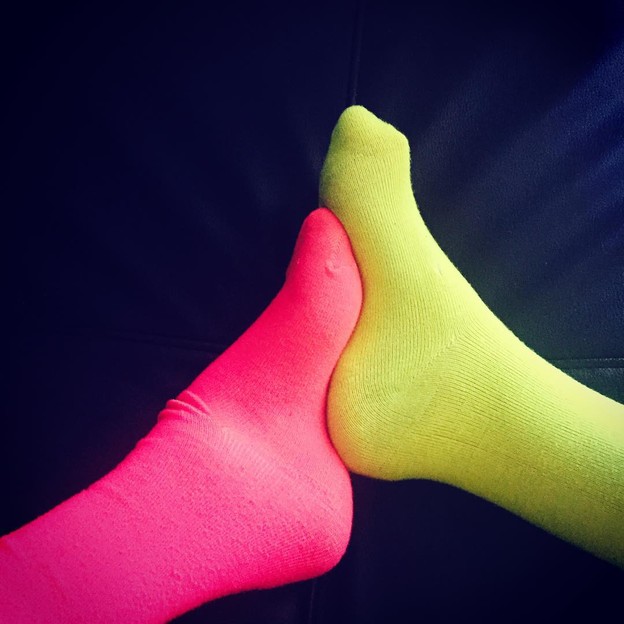An introduction to 'Discordance'

Bodies, like poems, always mean what they ceaselessly say: that even if they could speak — and they can — we would not understand them. — Craig Dworkin, “The Stutter of Form”
Disability is often perceived as deviance from some encoded norm; I know this as a disabled person who is regularly referred to as “weird.” Perhaps some people mean my large hair or loud clothing, but many are employing a euphemism to refer to my purple wheelchair or stumbling gait. Dear reader, I have used a disabled “I” so soon so you might know that this series is committed to the disability rights mantra “Nothing about us without us!” even as the “I” and “us” and “you” in this series are unstable (literally … you should see the scabs on my legs). Disability is in process, in relation. The prefix “dis-” alternately means “in twain, in different directions,” “between, so as to separate or distinguish,” and “having the sense of undoing or reversing.”[1] Discordance, then, as series, promises to make space for different hearts, polyvocality, and variation not as deviance but productive friction.
In the introduction to their recent work, The Matter of Disability, David Mitchell, Susan Antebi, and Sharon L. Snyder attempt to move away from perceptions of disability as deviance from some desired norm and instead recognize mutation and difference as ontology. They write that attention to “variation might serve as the foundation for modes of reconfiguring, reimagining, and renavigating the world.”[2] If that doesn’t sound like a call for a turn to disability poetics, I don’t know what combination of words would. Mitchell, Antebi, and Snyder go on to argue for a posthumanist disability studies in which the materiality of living with a disability is considered “part of an ongoing historical process,”[3] a materiality lacking from the social model of disability, which has focused on socially constructed barriers to participation and has been most prominently concerned with discursive arguments for disabled people within the realm of politics. In following their move toward deprioritizing the discursive over the material, I open Jennifer Bartlett’s preface to Beauty is a Verb: The New Poetry of Disability on my e-reader and try to get to the % in the book where Bartlett wonders how poets like herself who “have a disability, but do not align themselves with identity poetry or the disability poetics movement”[4] fit into this new poetry. According to Bartlett, the book includes many, but not an exhaustive set of, understandings of disability. While Beauty is a Verb avoids mainstream work that perceives “disability as tragedy” it doesn’t even go so far as to condemn such work.[5] In “Discordance,” I seek to continue the work of Bartlett and Mitchell, Antebi, and Snyder by gathering multiplicitous and various experiences of the materiality of disability.
Kathi Wolfe, one of the bodyminds behind Zoeglossia (a community for disabled poets), stated in a forthcoming interview that “poetry is from the body (our personal bodies and, broadly, the body politic). I write poetry from a disabled body. And, I live and work in a culture where every act that we do — in our lives and in our work — is, speaking broadly, political.”[6] This perspective locates the methods of disabled writing and disabled poetry as intrinsically material, social, and various. While some might perceive Wolfe’s feminist move of scaling the personal to the politcal as a primarily discursive one, Wolfe attends to the materiality of disability in this scaling. She writes, “because of my vision impairment, I do a lot of thinking and writing in my head. Sometimes consciously. Sometimes unconsciously. I read by listening to audio books, by Kindle or on my iPad. I’ll read poetry often as a PDF on my iPad. Because PDFs don’t screw up the line breaks. On Kindle, iPad, or in a PDF I can enlarge the text. When I can find it on audio format, I’ll listen to poetry. And, I go to as many poetry readings, as I can.”[7] Her lived experience as a disabled poet is found materially on the page in line breaks she describes as periodically “odd,” and her role as a reader is often changed to that of a listener as she trades inaccessible texts for the community of the poetry reading when she can, despite being a self-described introvert.
My method in this commentary series is to engage in conversation, via accessible formats, with disabled authors and performers to discuss their discordant and frictive approaches to their work. I will ask them to describe the ways in which their experiences of disability impact their relation to the page or stage or screen. I will ask them to comment on how, though poetry and performance are often perceived as primarily working in metaphors and the discursive, their work is manifest materially. The conversation with these creators is ultimately attentive to their discordant methodologies as generative of various perspectives and processes of reconfiguring the world through a poetics of disability.
1. Oxford English Dictionary, s.v. “dis-.”
2. David Mitchell, Susan Antebi, and Sharon L. Snyder, “Introduction” in The Matter of Disability: Materiality, Biopolitics, Crip Affect (Ann Arbor, MI: University of Michigan Press, 2019), 19.
3. Mitchell, Antebi, and Snyder, The Matter of Disability, 3.
4. Jennifer Bartlett, “Preface” in Beauty is a Verb: The New Poetry of Disability, eds. Shelia Black, Jennifer Bartlett, and Michael Northen (El Paso, TX: Cinco Puntos, 2011), 3% [15].
5. Bartlett, Beauty is a Verb, 3% [15].
6. Kathi Wolfe, personal correspondence (4 August 2019).
Discordance: Disability Poetics In Process and Community